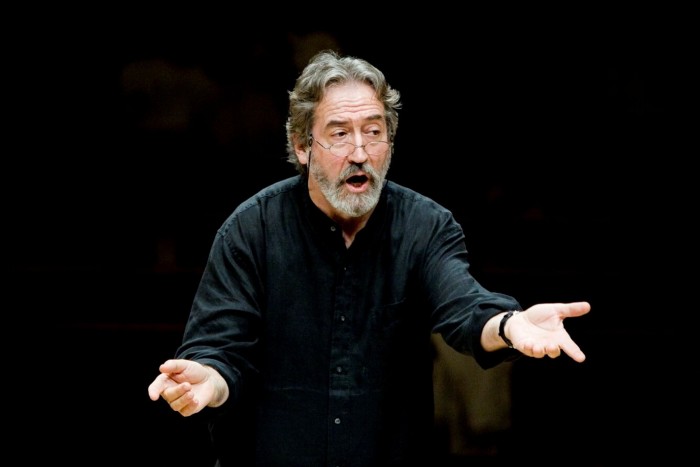Musician Jordi Savall: ‘The west is an important culture, but not the only culture in the world’

[ad_1]
“I am from Barcelona. It’s a city open to the Mediterranean. When you go to the sea and you see the immensity of the horizon” — Jordi Savall opens his arms wide — “you have other perspectives and you are interested to see what happens after this horizon.”
Savall, who has just turned 81 but whose energy is undiminished, has spent a lifetime making music that explores what happens over the horizon. Next week he brings two of these projects to the Edinburgh International Festival: an examination of the mix of cultures in 18th -century Istanbul through the compositions of Dimitrie Cantemir, and a recreation of the travels of the 14th-century traveller Ibn Battuta, whose peregrinations dwarfed those of Marco Polo.
Savall was born in Catalonia two years after the end of the Spanish civil war, to Republican parents. “There was still persecution against Catalans, against the Catalan language. My name when I was born was [the Spanish] Jorge: it was impossible to put [the Catalan] Jordi.” To minimise any Falangist influence on his education, his father placed him in a Catholic primary school. On his first day, “at 9 o’clock in the morning there was a mass, and I loved it. The next day I asked the director to give me the chance to sing. I sang for the next seven years. That was my essential musical education, singing every day.”
After his voice broke and he had a brief flirtation with Elvis Presley, he was next entranced by hearing a rehearsal of Mozart’s Requiem with a string quartet: “If the music has this power, I will have to be a musician.” He decided to learn the cello and, at 24, he switched to the cello’s Baroque ancestor, the viola da gamba, which became his primary instrument. In the 1960s it had fallen completely out of favour, so Savall went digging for music, first in the British Museum’s library, where he found “the enormous repertoire” of composers such as Tobias Hume, Matthew Locke and Henry Purcell, and then in Paris, where he unearthed works by Marin Marais and François Couperin. His efforts to revive these forgotten works as well as break down barriers between western classical music and its equivalents from the rest of the world have been the hallmarks of his career.
Savall performing with his wife, soprano Montserrat Figueras, in 2006 © Hiroyuki Ito/The New York Times
With his wife, the soprano Montserrat Figueras, he founded the early-music group Hespèrion XX (later, for obvious reasons, Hespèrion XXI); the couple also founded La Capella Reial de Catalunya, a period choir, and its associated orchestra Le Concert des Nations. All three groups are impressively productive. “I have the fortune,” says Savall, “to be a musician and at the same time a good organiser.” He credits an unlikely source for this. “When I was 14 I was not a good student. My father sent me to a pullover factory where I worked eight hours a day from 14 to 19. I learned slowly how to control the production, to control quality, to control stock, sales — these five years of experience, they helped me during my life. When I founded Hespèrion I did everything myself.”
In 1998 Savall set up his own label, Alia Vox (“Other Voice”), which has sold 5mn records. The albums are rehearsed slowly — a new collection of late Beethoven symphonies has been in preparation for six years — but then recorded quickly. “I try to record when we are at the high point of love, the mixture of enthusiasm and experience — when we still have this fascination that you can only have when you are 100 per cent in love with the music.” Savall himself has recorded more than 100 albums.
This cottage industry was a family business — with Figueras, until her death in 2011, and the couple’s children, Arianna and Ferran. “I was fascinated by her vocals, and Montserrat was fascinated by the viola’s song, its melody. It was a perfect combination.” The children now have their own careers. “It’s very difficult to be ‘the son of’,” Savall concedes with fondness. “Fathers take so much space.”
Alia Vox’s signature releases are “CD-books” — large boxes that tell historical stories through both music and richly illustrated documentation in five languages (including Catalan). They concentrate on the meetings of musical cultures, either in cities (Jerusalem, Istanbul) or through travellers (Ibn Battuta; the 16th-century Jesuit missionary Francis Xavier, who went to India and nearly made it to mainland China). He paraphrases an insight from author Elias Canetti’s Die Provinz Des Menschenwhich says that music represents “the ‘through-life history of the human being’. It’s always alive and can touch you in your heart directly with emotion. When you sing a song from the troubadour time and you sing it with emotion, you will have the same emotions as the people at the time. This is the best way to learn history.”

The Ibn Battuta project combines musicians “from Morocco, from Syria, from Turkey, from Afghanistan, from China — you can follow the travel and have in every city the music that corresponds to the culture.” The pieces are linked by a spoken narrative. “Through the writings of The Rihla” — Ibn Battuta’s account of his travels — “we discover the situations, how people lived, their cultures.”
Dimitrie Cantemir, by contrast, went nowhere by choice: he was an 18th-century Moldavian prince taken to the court of the Ottoman sultan as, in effect, a hostage. This concert combines his compositions from his time among the Ottomans with Armenian, Greek and eastern Mediterranean pieces.
Savall takes a lesson from the history of Ibn Battuta and his travels through Africa and Asia. “Today we have lost freedom. This person travelled for 40 years through the world without any difficulties.” (A slight overstatement: Ibn Battuta, on his own account, was kidnapped and robbed on his way to India, shipwrecked and forced to work as a judge in the Maldives.) “Today, to have visas for the musicians from Morocco, from Turkey, from Madagascar to come to the concert, it’s impossible . We still don’t know if some musicians will get their visas. It’s terrible. It’s inhuman.
“Ibn Battuta demonstrated an acceptance of people coming from other cultures. His testimony was that the world is very rich and every culture has its own characteristics and its own spirit. I think it’s important to remember that we [in the west] are an important culture, but we are not the only culture in the world. Music remains the best way to connect these cultures.”
Jordi Savall and Hespèrion XXI perform ‘Ibn Battuta: The Traveller of Time’ at Usher Hall, Edinburgh on August 17 and ‘Istanbul 1710’ at the Queen’s Hall, Edinburgh on August 18, eif.co.uk
[ad_2]
Source link





